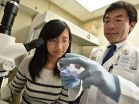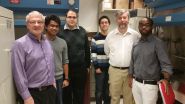(Press-News.org) A Jackson Laboratory research team has found that the misfolded proteins implicated in several cardiac diseases could be the result not of a mutated gene, but of mistranslations during the "editing" process of protein synthesis.
In 2006 the laboratory JAX Professor and Howard Hughes Medical Investigator Susan Ackerman, Ph.D., showed that the movement disorders in a mouse model with a mutation called sti (for "sticky," referring to the appearance of the animal's fur) were due to malformed proteins resulting from the incorporation of the wrong amino acids into proteins as they are being produced.
In new research published in the Proceedings of the National Academy of Sciences, performed in collaboration with Paul Schimmel, Ph.D., and colleagues of The Scripps Institute, Ackerman and colleagues demonstrate that the same mechanism leads to misfolded proteins and cell death in the heart.
"We now have the second description of mistranslation causing pathology, this time in the heart," Ackerman says. "We know that in certain heart diseases, such as desmin-related cardiomyopathy and systemic amyloidosis, cardiomyocytes can accumulate malformed proteins. This is analogous to the toxic sludge of misfolded proteins that, in neurodegenerative diseases like Huntington's, kills neurons."
To understand the effects of mistranslation, the researchers tinkered with the ability of alanyl-tRNA synthetase, an enzyme involved in protein synthesis, to fix its mistakes. Alanyl-tRNA synthetase is supposed to load the amino acid alanine onto specific transfer RNAs (tRNAs), which then transport the alanine to ribosomes, where it is added to proteins under construction.
However, on occasion this enzyme puts the wrong amino acid on these tRNAs. When this occurs, the enzyme recognizes the error and removes the amino acid preventing it from being included at the wrong site in the protein. A severe reduction in this process, called editing, led to early embryonic lethality, suggesting that editing is important in multiple cell types, not just neurons.
"Then we asked, what if we take sticky mutation, which still has some editing potential, and lower the amount of the enzyme by half?" Ackerman says. "And we found that, indeed, this loss of editing activity did have an effect on the heart, leading to the death of cardiomyocytes and affecting the function of the heart."
The results suggest that genetic factors that disrupt the accuracy of translation may contribute to defects of the heart and possibly other tissues, as well as the brain, Ackerman notes.
INFORMATION:
The Jackson Laboratory is an independent, nonprofit biomedical research institution and National Cancer Institute-designated Cancer Center based in Bar Harbor, Maine, with a facility in Sacramento, Calif., and a new genomic medicine institute in Farmington, Conn. It employs 1,600 staff, and its mission is to discover precise genomic solutions for disease and empower the global biomedical community in the shared quest to improve human health.
Research that provides a new understanding of how bacterial toxins target human cells is set to have major implications for the development of novel drugs and treatment strategies.
Cholesterol-dependent cytolysins (CDCs) are toxins produced by major bacterial pathogens, most notably Streptococcus pneumoniae and group A streptococci, which collectively kill millions of people each year.
The toxins were thought to work by interacting with cholesterol in target cell membranes, forming pores that bring about cell death.
Published today in the prestigious journal Proceedings ...
A commonly prescribed muscle relaxant may be an effective treatment for a rare but devastating form of diabetes, researchers at Washington University School of Medicine in St. Louis report.
The drug, dantrolene, prevents the destruction of insulin-producing beta cells both in animal models of Wolfram syndrome and in cell models derived from patients who have the illness.
Results are published Nov. 24 in the Proceedings of the National Academy of Sciences (PNAS) Online Early Edition.
Patients with Wolfram syndrome typically develop type 1 diabetes as very young children ...
(Edmonton) A team of researchers from the University of Alberta has discovered a new approach to fighting breast and thyroid cancers by targeting an enzyme they say is the culprit for the "vicious cycle" of tumour growth, spread and resistance to treatment.
A team led by University of Alberta biochemistry professor David Brindley found that inhibiting the activity of an enzyme called autotaxin decreases early tumour growth in the breast by up to 70 per cent. It also cuts the spread of the tumour to other parts of the body (metastasis) by a similar margin. Autotaxin is ...
High blood pressure and nonalcoholic fatty liver disease (NAFLD) are two emerging health problems related to the epidemic of childhood obesity. In a recent study, researchers at University of California, San Diego School of Medicine sought to determine the prevalence of high blood pressure in children with NAFLD, which places them at risk for premature cardiovascular disease.
The study, published in the November 24 edition of PLOS ONE, found that children with NAFLD are at substantial risk for high blood pressure, which is commonly undiagnosed.
"As a result of our ...
PRINCETON, N.J.--A team led by researchers from Princeton University, Michigan State University and the Indonesian Institute of Sciences have confirmed the discovery of a new bird species more than 15 years after the elusive animal was first seen on the Indonesian island of Sulawesi.
The newly named Sulawesi streaked flycatcher (Muscicapa sodhii), distinguished by its mottled throat and short wings, was found in the forested lowlands of Sulawesi where it had last been observed. The researchers report in PLOS ONE that the new species is markedly different from other flycatchers ...
November 24, 2014 - Differences in breast size have a significant mental health impact in adolescent girls, affecting self-esteem, emotional well-being, and social functioning, reports the December issue of Plastic and Reconstructive Surgery®, the official medical journal of the American Society of Plastic Surgeons (ASPS).
More than just a "cosmetic issue," breast asymmetry can have negative psychological and emotional effects, according to the study by ASPS Member Surgeon Dr. Brian I. Labow and colleagues of Boston Children's Hospital. They suggest that early intervention ...
November 24, 2014 - For women considering breast reduction surgery, initial evaluation at a shared medical appointment (SMA) provides excellent patient satisfaction in a more efficient clinic visit, reports a study in the December issue of Plastic and Reconstructive Surgery®, the official medical journal of the American Society of Plastic Surgeons (ASPS).
Shared medical appointments have additional benefits, including "group learning, peer support, and a sense of solidarity and commonality" among women learning about breast reduction surgery, according to the study ...
Climate change could lengthen the growing season, make soil drier and decrease winter snowpack in the Lake Michigan Basin by the turn of the century, among other hydrological effects.
A new U.S. Geological Survey precipitation and runoff model shows that by 2100, maximum daily temperature in the Lake Michigan Basin could increase by as much as seven degrees Fahrenheit, and the minimum daily temperature by as much as eight degrees. A new USGS report published today summarizes the potential hydrological effects of these increases on the basin through 2099. The tools can ...
Lincoln, Neb., Nov. 24, 2104 -- The improvements in random access memory that have driven many advances of the digital age owe much to the innovative application of physics and chemistry at the atomic scale.
Accordingly, a team led by University of Nebraska-Lincoln researchers has employed a Nobel Prize-winning material and common household chemical to enhance the properties of a component primed for the next generation of high-speed, high-capacity RAM.
The team, which published its findings in the Nov. 24 edition of the journal Nature Communications, engineered and tested ...
Parents who spend their time playing with and talking to their five-month-old baby may wonder whether their child remembers any of it a day later.
Thanks to a new BYU study, we now know that they at least remember the good times.
The study, published in Infant Behavior and Development, shows that babies are more likely to remember something if there is a positive emotion, or affect, that accompanies it.
"People study memory in infants, they study discrimination in emotional affect, but we are the first ones to study how these emotions influence memory," said BYU psychology ...


